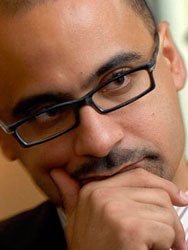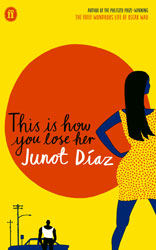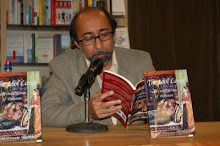Old Reviews:
Act of liberation or trap
Diaz’s stories and their characters cannot be fully appreciated without understanding the place called Dominican Republic
By Moazzam Sheikh
Act of liberation or trap
Diaz’s stories and their characters cannot be fully appreciated without understanding the place called Dominican Republic
By Moazzam Sheikh
The talented Junot
Diaz’s third book can both be read as a novel or a collection of short
stories or a sort of a novel in stories. With the publication of
‘This Is How You Lose Her’, it
is clear that Diaz has developed his signature idiom and language register.
This can both be an act of liberation (in the post-colonial sense, at least)
and a trap.
The prose keeps the reader
in its spell. In the hands of the writer, language itself becomes a subject
matter that glues all nine stories together. What else provides the book its
cohesiveness is that pretty much all the characters are of Dominican Republic
heritage making out a future as immigrants. Some are victims but some are
survivors of the proverbial American Dream.
Seen from a feminist lens,
the book posits a thesis that men are bigger victims whereas most women are
real survivors because the two-fold patriarchal system that oppresses them
cannot finish them off. Most men introduced in the various stories
disintegrate, both literally and figuratively.

In his classic work
The ‘Ethnic Myth: Race’, Ethnicity, and Class in America, Stephen Steinberg debunked the view that it is the
immigrant’s cultural values and ethnic traits that determine his/her
economic destiny. Instead, the sociologist has tried to prove that locality,
class conflict, selective migration, and other historical and economic
factors played more dominant roles in her success. In short, there is no such
thing as a Model Minority. Instead, it is the mode of entry.
It is for this reason I
stress that Diaz’s stories and their characters cannot be fully appreciated
without understanding the place called Dominican Republic.
Is it a prosperous country?
Is it a poor nation? Is it an independent entity? A place traumatised by
persistent colonialism? Is it a banana republic? What is its relationship to
the US? A cursory glance would reveal American rule and regular intervention,
including the toppling of the democratically-elected president Leonel Fernández.
The two biggest sources of income, it seems, are a large Dominican diaspora
that sends money and its service industry, and its top-notch golf courses
that attract tourists all year round. These golf courses are situated in
off-limit areas where the natives cannot go. The very first story in the
collection touches on this theme.
Colonialism damages, among
other things, the conquered man’s sense of virility; complicating further
the idea of male proprietorship. The author himself may not have helped in
this case. He went along with the prevalent assumption that the gullible
readership prefers to read the lines which sparkle with male promiscuity and
sexual and sexist language as the Dominican male’s uncontrollable urge to
be consistently unfaithful in marital and romantic relationship instead of
reading between the lines.
The book’s protagonist,
Yunior, laments the fact that, like most Dominican men, his father and
brother were both unfaithful and addicted to sex. Yunior confesses his
sadness at the fact that the sex addict gene did not skip him, and his
girlfriend, whom he loved dearly, breaks up with him after finding through
his emails that he had cheated on her with 50 other women. The figure 50 is
not a careless throw of a number. It stands for the 50 states of America,
even if Diaz numbers it subconsciously. The idea at play here is that the
seduction of the fifty has caused Yunior to lose his one true love — the
life in Dominican Republic.
What the author is trying
to tell the reader is that it was inevitable. For the humiliation and
self-devaluation that Dominican men go through when they arrive in the US
results in tremendous pain. That mixed with a feeling of devalued sense of
malehood, the easiest recourse is to seek out a drug that numbs the pain.
This drug comes in the form of addiction to sexual conquest that temporarily
boosts the male ego.
The living conditions in
the US for men of a certain class, that Yunior’s father and brother belong
to, are harsh as is evident in story after story. Yunior’s father’s
disappearance and brother’s succumbing to cancer is metaphorical in a
sense. The real cancer in the American society is racism. This comes out in
full force in the final chapter. Our protagonist by this time is living in
Boston, a city famous for higher learning, and despite all odds has managed
to land a job as a professor. This is no mean achievement. But pay attention
to the following lines:
“Almost on cue a lot of
racist shit starts happening. Maybe
it was always there, maybe you’ve become more sensitive after all
your time in NYC. White people pull up at traffic and scream at you with a
hideous rage, like you nearly ran over their mothers. It’s f***ing scary.
Before you can figure out what the f*** is going on they flip you the bird
and peel out. It happens again and again. Security follows you in stores and
every time you step on Harvard property you’re asked for ID. Three times,
drunk white dudes try to pick fights with you in different parts of the
city… You take it all very personally. I hope someone drops a f***ing
bomb on this city, you
rant. This is why no people of color want to live here. Why all my black and
Latino students leave as soon as they can…”
The paragraph above does
not only remind us about what happened to Professor Henry Louis Gates of
Harvard in 2009, it is too prophetic. Though by the middle of the last story
Yunior has completely fallen apart, he ends the novel on hope.

Part of the reason why I
chose to review this remarkable piece of fiction was that the aspect of
connecting the sexual with the political was completely missing from other
reviews I read — that the book was not about a critique of some genetic
disorder in Dominican men when it comes to sexual behaviour.
Rather the book is
political. It is a critique of colonialism and foreign intervention that harm
indigenous balance of relationship. If it conquers your motherland and
demolishes the citizens’ sense of self-respect, it is only natural to
further disrespect the female sex as it was already the weaker of the two in
terms of political and economic status quo.
The other reason in
reviewing the book was to bring attention to the dearth of this kind of
political fiction — exploring the “sexual is political” paradigm —
written by people of Pakistani origin, be it in English or Urdu. In my
limited experience, I have witnessed more frankness and risk in Punjabi
fiction than in Urdu or English. What Junot Diaz does so brilliantly in this
book is that he announces a break with the middle class sensibility; not only
in terms of the subject matter but in terms of language itself.
While Yunior’s character
may be an subconscious homage to Holden Caulfield (protagonist of
‘The Catcher in the Rye’), his language is a homage to America’s
modern urban reality.
Moazzam Sheikh’s
collection of stories ‘Cafe Le Whore and Other Stories’ is due this year.
No comments:
Post a Comment